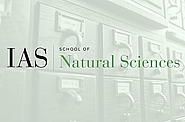Joint IAS Princeton University Astrophysics Colloquium
Apr
23
2024
Institute for Advanced Study / Princeton University Joint Astrophysics Colloquium
A Golden Age of Asteroseismology with Kepler and TESS
Tim Bedding
11:00am|Peyton Hall Auditorium
Apr
16
2024
Institute for Advanced Study / Princeton University Joint Astrophysics Colloquium
Radiatively-cooled Magnetic Reconnection Experiments
Jack Hare
11:00am|Peyton Hall Auditorium
Apr
09
2024
Institute for Advanced Study / Princeton University Joint Astrophysics Colloquium
The Cost of Brightening Night Skies on Ground-Based Astronomy
Aparna Venkatesan
11:00am|Peyton Hall Auditorium
Apr
02
2024
Institute for Advanced Study / Princeton University Joint Astrophysics Colloquium
How well can we estimate stellar ages?
Jamie Tayar
11:00am|Peyton Hall Auditorium
Mar
26
2024
Institute for Advanced Study / Princeton University Joint Astrophysics Colloquium
Early r-process enrichment in globular clusters
Evan Kirby
11:00am|Peyton Hall Auditorium
Mar
19
2024
Institute for Advanced Study / Princeton University Joint Astrophysics Colloquium
A "Cloud-Scale" View of the Matter Cycle in Galaxies
Adam Leroy
11:00am|Peyton Hall Auditorium
Mar
05
2024
Institute for Advanced Study / Princeton University Joint Astrophysics Colloquium
Planet Nine from Outer Space
Matt Brown
11:00am|Peyton Hall Auditorium
Feb
27
2024
Institute for Advanced Study / Princeton University Joint Astrophysics Colloquium
Towards EeV neutrino astronomy with GRAND
Kumiko Kotera
11:00am|Peyton Hall Auditorium
Feb
20
2024
Institute for Advanced Study / Princeton University Joint Astrophysics Colloquium
Finding Relativistic Stellar Explosions as Fast Optical Transients.
Anna Ho
11:00am|Peyton Hall Auditorium
Feb
13
2024
Institute for Advanced Study / Princeton University Joint Astrophysics Colloquium
Measurements of the Expansion Rate of the Universe and the Lingering Hubble Tension
Dan Scolnic
11:00am|Peyton Hall Auditorium
